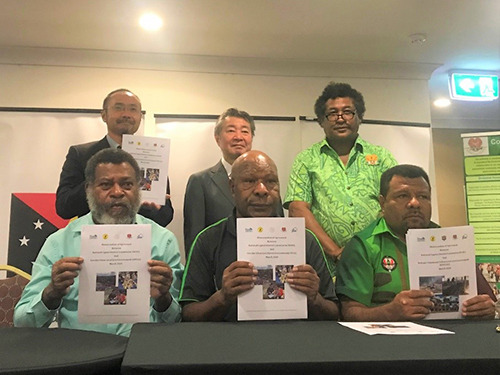
Signing ceremony for City-City cooperation between NCDC and each ULLGs
1. Introduction & Background
Over several decades, waste has become one of the major concerns for small island countries in the Pacific region because of severe challenges in coping with the increasing volume and changing characteristics of urban and industrial wastes. Improper waste management has potential to pose a significant negative impact on public health, water and food supply, ecosystems, tourism and trade, resources, and even climate change, which threaten sustainable development in this region.
Such unique constraints as geographical isolation, limited resources and economic scale, and dependence on foreign aid and imported goods have made management of solid waste more difficult for Pacific Island countries (PICs).
In order to realize the commitment of the Government of Japan at the 2nd PALM (Japan-Pacific Leaders' Meeting) in 2000, JICA started assisting PICs in terms of solid waste management in collaboration with SPREP.
Under the Pacific Regional Solid Waste Management Strategy (2016-2025) as Cleaner Pacific 2025 which has been already formulated in previous J-PRISM cooperation, JICA has conducted "Japanese Technical Cooperation Project for Promotion of Regional Initiative on Solid Waste Management, Phase II (J-PRISM II)" in partnership with the responsible agencies of the waste management of each target countries and SPREP.
Regarding the previous J-PRISM project, successive technical cooperation programs contributed to raising the capacity of local counterparts. They even became an essential resource person not only in their respective countries but also in the surrounding countries in the region, as experts or trainers. Also, "3R + Return" concept has been promoted during J-PRISM project. Most of the countries in the region are lacking recycling facilities and limited recycling markets in the country due to the small scale of the economy. The "3R+Return" concept would promote the proper resource recycling and appropriate disposal by exporting (returning) valuable waste or difficult waste for disposal while returning organic waste into soil for effective utilization.
To promote regional cooperation and south-south cooperation effectively and efficiently, it is expected that these human resource exchange programs would be set up as a firm system in the Pacific, not just relying on each country's initiative/effort.
Also, for the realization of "3R+Return" concept, proper organic waste treatment, effective/efficient resource recycling, and appropriate disposal, within and across the country would be significant, but it is still a continuous challenge among PICs to set up "3R+Return" system.
2. Basic Information
- JICA Cooperation Scheme: Technical Cooperation
- Target Development Sector: Waste Management
- Target SDGs: Goal 12 Responsible Consumption and Production
- Counterpart Organization (Web URL):
-
National Capital District Commission (NCDC)
Website: https://ncdc.gov.pg/ (external link) - Conservation and Environment Protection Agency (CEPA)
Website: https://www.pngcepa.com/ (external link) - Duration: Mar 2017 - September 2022 (Completed)
- Amount: PGK 5.9M
- Target Provinces, Location: NCD, Kokopo, Alotau, Lae and Goroka
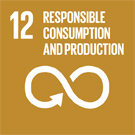
3. Outline of Project
- Project purpose:
Institutional framework and implementing capacity in Solid Waste Management (SWM) are enhanced at national and major urban local level governments (ULLGs) level. - Overall goal:
Sustainable management of solid waste in the Pacific region is enhanced based on Pacific Regional Waste and Pollution Management Strategy 2016-2025 (Cleaner Pacific 2025) - Outputs
Output 1: Institutional capacity on SWM is enhanced through development of a National Policy, Strategy and Implementation Plan in line with the Cleaner Pacific 2025.
Output 2: Planning capacity to tackle with the issues on SWM of some ULLGs is enhanced.
Output 3: NCD WM Plan 2016 - 2025 is implemented sustainably as scheduled.
4. More information (Ex. Brochure)
Snap Photos
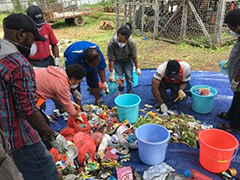
Waste audit in Goroka in cooperation with NCDC
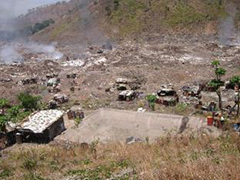
Baruni Disposal Site (Before)
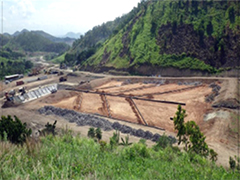
Baruni Disposal Site (Upgraded)
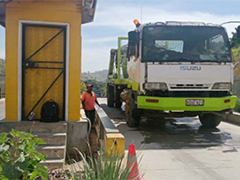
Installation of the weighbridge system in the Baruni Disposal site
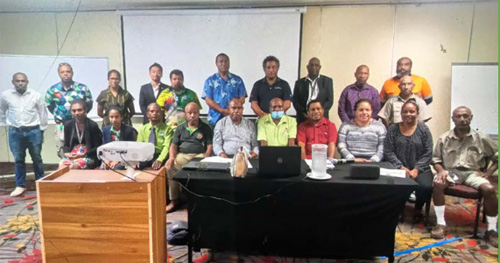
Validation workshop for National waste management policy - Port Moresby, July 2022





scroll